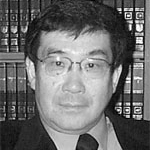
Dean and Director, Institute for Advanced Humanistic Studies (IHAS), Peking University
Former Director of the Harvard-Yenching Institute
 Prof. TU Weiming is engaged in the re-appreciation of traditional values and thinking in contemporary China, particularly Confucianism. He – and many other intellectuals who can be called “New Confucianists” – deem this necessary to remedy the moral and ideological void in Mainland China left after the uprooting of traditional values during the 20th century and the more recent decline of Communist idealism. He aims to reestablish the connected cultural foundation of the Chinese World, which he describes as the three “universes” of “Cultural China”. Prof. Tu sees an intellectual imbalance caused by the supremacy of Western enlightenment thinking and discusses Confucian humanism as a complement to it.
Prof. TU Weiming is engaged in the re-appreciation of traditional values and thinking in contemporary China, particularly Confucianism. He – and many other intellectuals who can be called “New Confucianists” – deem this necessary to remedy the moral and ideological void in Mainland China left after the uprooting of traditional values during the 20th century and the more recent decline of Communist idealism. He aims to reestablish the connected cultural foundation of the Chinese World, which he describes as the three “universes” of “Cultural China”. Prof. Tu sees an intellectual imbalance caused by the supremacy of Western enlightenment thinking and discusses Confucian humanism as a complement to it.
Born in Kunming, Yunnan Province, Prof. Tu received his B.A. in Chinese Studies fro Tunghai University, Taiwan (1961) followed by Harvard University where he received his M.A. in Regional Studies of East Asia (1963) and Ph.D. in History and East Asian Languages (1968). From 1966 to 1967 Prof. Tu was a Lecturer in the Humanities at Tunghai University and from 1968 to 1971 Assistant Professor in East Asian Studies at Princeton University. From 1971 until 1981 he successively was Assistant Professor, Associate Professor and then Professor of History at UC Berkeley. In 1981 he returned to Harvard to become Professor of Chinese History and Philosophy. From 1990 until 1991 he was Director of the Institute of Culture and Communication at the East-West Center in Hawaii. Between 1996 and 2010 Prof. Tu was appointed Director of the Harvard-Yenching Institute. In 1999 he was honored as the Harvard-Yenching Professor of Chinese History and Philosophy and of Confucian Studies, a post he held until 2010. This was the first time that a professorship was named “Confucian Studies” in the English-speaking world.